Several decades ago, Larry Woiwode was a young author, his novels nominated for all the most prestigious literary prizes, his essays anthologized in creative writing readers, his by-line found in both academic journals and popular magazines known for good writing such as The Atlantic Monthly, Harpers, The Paris Review and the like. He was invited to replace the inestimable John Gardner in his writing program at Binghamton after Gardner’s death by motorcycle accident in northern Pennsylvania. Books such as Beyond the Bedroom Wall and What I’m Going to Do, I Think were in vogue and rightly so. He was asking important questions in his important work and, we come to find out later, he was desperate. He began reading the Bible and became an Orthodox Presbyterian. His next novel, Poppa John–which featured a clown and a conversion and which I truly enjoyed–was panned. Now that he was a person of faith had his craft weakened? Was he a worse storyteller? Was it cheesy to put a conversion story in a contemporary work of fiction? Or was he every bit the same excellent novelist and the New York literary establishment unfairly despised his religious faith and how it shaped his latest work? Well, that was a long time ago, it seems. Over a decade ago, in 2000, he did his first memoir, an autobiographical book called What I Think I Did: A Season of Survival in Two Acts (Basic; $15.95.) More recently, in a highly regarded memoir he wrote for his son (upon being sparred from a near-death experience with a hay-baler), he takes readers to his early days as a writer, and into his interior life as farmer, husband, father. That is called A Step From Death (Counterpoint; $15.95.)

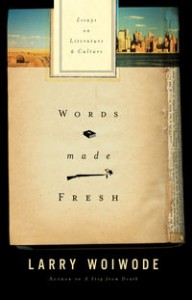 Years later, Mr. Woiwode remains a Christian, has deepened and widened intellectually, and is respected as a novelist and perhaps more so as essayist and critic. He has written poetry, a book-length Bible reflection, a memoir which gathered great reviews Words Made Fresh: Essays on Literature and Culture (Crosway; $24.99) is a brand new and very handsome hardback volume collecting some of his well-crafted essays, spanning his career, mostly about literature.
Years later, Mr. Woiwode remains a Christian, has deepened and widened intellectually, and is respected as a novelist and perhaps more so as essayist and critic. He has written poetry, a book-length Bible reflection, a memoir which gathered great reviews Words Made Fresh: Essays on Literature and Culture (Crosway; $24.99) is a brand new and very handsome hardback volume collecting some of his well-crafted essays, spanning his career, mostly about literature.
A famous Esquire piece, “Guns” from 1975, opens the book with an allusive yet helpful afterword, indicating obliquely that he has found greater peace since those turbulent years. All of the subsequent pieces, in fact, are considerably re-worked, added to, expanded and updated, giving the very title of the book a bit of a double meaning. Words Made Fresh is, obviously, an allusion to the beloved and central Christian notion of incarnation–the Word made flesh–but also indicates that these older words of Woiwode have been freshened up a bit. Not that they needed refreshing (although it is good that some are brought up to date, citing more recent books by the authors under consideration.) These were excellent and nearly timeless, even though they are now updated. What a treasure trove this is.


It is curious to me that this profound collection of serious literary criticism ended up at Crossway books, who has long published books on evangelical faith, including some about faith in the marketplace of ideas, social engagement; they released books on the arts, film, literature and such, influenced as they were by Francis Schaeffer, who emphasized historic,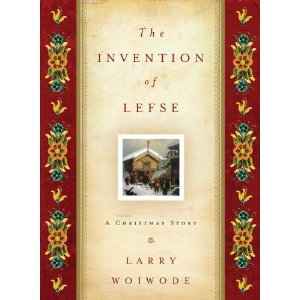 orthodox faith applied robustly to the culture at large. They do good work, of course, and, in fact, published a version of the controversial Woiwode novel that was panned by the literati. Yet, this new book is so beyond the scope of the typical “Christian Booksellers Association” release that it is breathtaking to see it published by Crossway. Kudos to them, I guess. (And kudos that they will publish early this fall a new hardback Christmas novella by Mr. Woiwode, to be called The Invention of Lefse: A Christmas Story; $12.99. You can pre-order it now, if you’d like, at the BookNotes discount, below.)
orthodox faith applied robustly to the culture at large. They do good work, of course, and, in fact, published a version of the controversial Woiwode novel that was panned by the literati. Yet, this new book is so beyond the scope of the typical “Christian Booksellers Association” release that it is breathtaking to see it published by Crossway. Kudos to them, I guess. (And kudos that they will publish early this fall a new hardback Christmas novella by Mr. Woiwode, to be called The Invention of Lefse: A Christmas Story; $12.99. You can pre-order it now, if you’d like, at the BookNotes discount, below.)
Still, this current work, Words Make Fresh: Essay on Literature and Culture could have been easily published by any number of prominent mainstream publishing houses. Any serious bookstore that cares about contemporary fiction will have it, if they order from such a singularly Christian publisher. It should be considered a very prominent collection.
As a fan of Wendell Berry, perhaps Larry Woiwode wanted to be published by an independent publisher. (Most New York publishers are “controlled by a conglomerate, or owned by a television network or oil company or German corporation” Woiwode points out in a piece about the craftsmanship and financial woes of Wendell Berry’s one-time indie publisher, North Point Press, which became for a season Counterpoint, and is now Shoemaker & Hoard.) Anyway, regardless of the publisher, parochial or not, this is literary criticism at its finest, offering exceptionally thoughtful ruminations, wonderfully-written observations, reviews and argument.
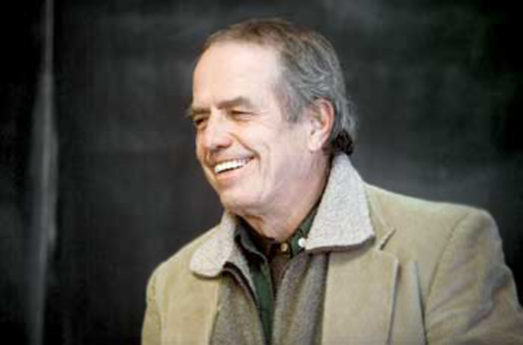 The work’s illuminating Christian influence is most often implicit, covert, as it were. He does not wear his faith on his sleeve, except when he does. And even then, it is lucid, poetic, demanding, classic (perhaps bringing to mind the great essays by Calvin scholar and Nobel Prize winning novelist, Marilyn Robinson.) Many, many serious writers have endorsed Woiwode’s work, from Charles Johnson (Middle Passages) to Brett Lott (who says of him “there is perhaps no better writer at work in America today…his books are built to last”) to Sven Birkerts to Jill Pelaez Baumgaertner. Gregory Wolfe, author of the recent Beauty Will Save the World: Recovering the Human in an Ideological Age (ISI; $29.95) is one of our best critics and he says “Larry Woiwode’s prose is so piercing and precise, so concrete and muscular, that I would read his reflections on the price of potatoes. In an era when words have become weapons or commodities, Woiwode reminds us that they can still become flesh and blood, full of grace and truth.”
The work’s illuminating Christian influence is most often implicit, covert, as it were. He does not wear his faith on his sleeve, except when he does. And even then, it is lucid, poetic, demanding, classic (perhaps bringing to mind the great essays by Calvin scholar and Nobel Prize winning novelist, Marilyn Robinson.) Many, many serious writers have endorsed Woiwode’s work, from Charles Johnson (Middle Passages) to Brett Lott (who says of him “there is perhaps no better writer at work in America today…his books are built to last”) to Sven Birkerts to Jill Pelaez Baumgaertner. Gregory Wolfe, author of the recent Beauty Will Save the World: Recovering the Human in an Ideological Age (ISI; $29.95) is one of our best critics and he says “Larry Woiwode’s prose is so piercing and precise, so concrete and muscular, that I would read his reflections on the price of potatoes. In an era when words have become weapons or commodities, Woiwode reminds us that they can still become flesh and blood, full of grace and truth.”
Oftentimes we recommend books, especially in the religious marketplace, that are inspiring, but not particularly deep. Or they are challenging, but not particularly gracefully written and we wade through it because we know the material is valuable; I sometimes call these “resources.” Occasionally, though, we find a book that is not a breeze to read, that is sometimes quite demanding, not because it is poorly written or dry but because it is so very profound, with a mature vocabulary and a slightly dense style, and yet we sense that it is worthy, a book we gladly spend the energy to read slowly, from which we enjoy learning. (Earlier in the summer I named the essayist Alan Jacobs somewhat in these terms; smart, eloquent, but serious-minded. Ditto with Greg Wolfe.) Larry Woiwode’s essays, in this volume at least, require some basic knowledge of American letters. In Words Made Fresh he writes about Gardner, of course (two splendid chapters) and has essays on Reynolds Price, John Updike, and a great article that had app
eared in Image on Bob Dylan—actually on Dylan’s view of the news, compared to CNN. There is a closing chapter called “The Faith of Shakespeare: My Favorite Actor” that Leland Ryken called “a small classic.” To be honest, if you do not know who these novelists are, you should read this as a mature and helpful way to be introduced.
 These essays–now updated and expanded–were previously published in places such as the Washington Post Book World, The Chicago Tribune Book World, The World and I. A provocative essay on education (“Deconstructing God: Teaching the Fourth R”) appeared in Civilization which is the magazine of the Library of Congress. (Man, for an organic farmer from Western North Dakota–he has been their Poet Laureate since 1995–this dude gets around!) One of the expanded chapters were first published by Books & Culture. Another was a rather auto-biographically-shaped lecture on faith and the arts given at a conference sponsored by the Graduate Theological Union at Berkley. I loved “Homeplace: Heaven or Hell? On the Order of Existence” so much I read most of it a second time out loud to Beth (and I understood some of it better then, too.) He notes that he was reading Wendell Berry in those years and I have heard he was also reading the aesthetic theory of Calvin Seerveld.
These essays–now updated and expanded–were previously published in places such as the Washington Post Book World, The Chicago Tribune Book World, The World and I. A provocative essay on education (“Deconstructing God: Teaching the Fourth R”) appeared in Civilization which is the magazine of the Library of Congress. (Man, for an organic farmer from Western North Dakota–he has been their Poet Laureate since 1995–this dude gets around!) One of the expanded chapters were first published by Books & Culture. Another was a rather auto-biographically-shaped lecture on faith and the arts given at a conference sponsored by the Graduate Theological Union at Berkley. I loved “Homeplace: Heaven or Hell? On the Order of Existence” so much I read most of it a second time out loud to Beth (and I understood some of it better then, too.) He notes that he was reading Wendell Berry in those years and I have heard he was also reading the aesthetic theory of Calvin Seerveld.
There is another great chapter that will be of interest to some BookNotes readers, I’m sure, on the work of Reynolds Price. It is brief and accomplishes three things, I’d say. It puts Price on the map for those who may not know him. It discusses his interesting work in translating, and reviews Price’s translation of the gospels. And, through-out, he pushes back against those in the literary establishment who seem to have an open mind about nearly everything except Christianity. There is bigotry afoot and Woiwode names it; those who are frustrated with liberal PC tone-deafness to nuances of faith will appreciate this chapter. And he gets away with it; the Boston Globe says of him “he continues to be a writer who can not only dazzle, but illuminate…There is something organic, whole, and necessary about his work; it blows fuses.”
And so, we celebrate this book, and the fuses it blows, and we are grateful that publishers like Crossway occasionally surprise us—they are particularly predictable these days, with fine stuff from the Gospel Coalition and a small bit of typically truly Reformed cultural engagement, and we stock almost all of their books. We are glad to be among the evangelical wing of the Christian Booksellers and yet have always pushed those envelopes, carrying books when we opened like, well, like Beyond the Bedroom Wall and What I’m Going to Do I Think. Woiwode published a paperback of Poppa John with Crossway in the mid ’80s and one sales rep said we were one of the very few Christian bookstore book buyers in the country who knew who he was. I doubt that that was true, but it indicative of an often-discussed problem of the anti-intellectualism and insularity of most religious bookstores, especially the chains. So we’ve followed this author’s work, read much of it, and are just delighted to have this great collection, now.
HERE you can find a brief little promo video conversation between John Wilson (of Books & Culture) and Mr. Woiwode, and then a longer one. (In the first he speaks of vampires and in the second, John Calvin, so take your pick.) The two of them collaborated as editors for The Best Christian Writing of 2001 so they have been friends for a while. Do watch it, but be sure to come back—you’ll want to see what I say is the best chapter in the book.
So, I must say this, about one chapter that is my favorite one in the book, I think. I believe that Larry Woiwode’s chapter on Wendell Berry (“Views of Wendell Berry: A Life Against Agribusiness”) is perhaps the finest short introduction to Berry’s writing (especially his nonfiction) that I have yet seen. I know it is a cliche, but it is nearly worth the price of the book, just for this helpful chapter.
We often tell customers that the best paperback book about Berry, written by friends Matt 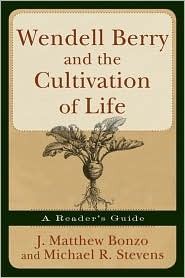 Bonzo and Michael Stevens is Wendell Berry and the Cultivation of Life: A Readers Guide (Brazos; $22.00) which is a great, great, book-length introduction. There are two more spectacular anthologies about Berry that have come out recently, both by University of Kentucky Press, and each are so good I could cry.
Bonzo and Michael Stevens is Wendell Berry and the Cultivation of Life: A Readers Guide (Brazos; $22.00) which is a great, great, book-length introduction. There are two more spectacular anthologies about Berry that have come out recently, both by University of Kentucky Press, and each are so good I could cry.
(One is called Wendell Berry and Religion: Heaven’s Earthly Life edited by Joel James Shuman & L. Roger Owens and the other is called The Achievement of Wendell Berry: The Hard History of Love by Fritz Oehlschlaeger. But they aren’t exactly introductory. They are large books with many specific chapters, and they are expensive–each one is $40.00, a shameful price tag that should be embarrassing to the authors, with a crummy discount to bookstores, at that, so we cannot mark them down or offer discounts. I can only guess that the editors at the University Press haven’t read Mr. Berry very closely and don’t want mom-and-pop bookstores to sell these books and that the authors somehow didn’t have the wherewithal to protest, so are complicit, in the exact way Berry so passionately warns about. Ironic.)
That said, we are thrilled with Larry Woiwode’s lovely one-chapter study of Berry’s localism, his sense of place, his literary life, his faith in the good nature of creation, his desire that our work and scale of living be ordered and attuned to the realities and givens of land and history— it is just the best! There are others who are perhaps more breathy and passionate in their joy for the radical critique Berry brings to the ways of North American living and there are many wonderful pieces about him. But I am really glad that this chapter is in this collection; it is helpful, sane, reasonable—nearly calming. Woiwode is not dispassionate—he himself, as I have noted, is an organic farmer and poet—but it seems that the most flamboyant line about Berry is the title of the chapter. It is a fantastic overview, with several good excerpts of a few of his early books. It makes Words Made Fresh, an already great book that much better.
Mr. Woiwode is a natural to tell us about Berry. Firstly, he has this unique experience of coming of age as a writer and student of literature in the last quarter of our previous century—under the shadow of the likes of Faulkner, maybe, but contemporary to Updike, Cheever and even Pynchon and, yes, the somewhat older Eudora Welty and Wendell Berry, whose first novel, Nathan Coulter, was published in 1960 and whose first bit of cultural criticism, The Long Legged House, came out in 1969, followed up quickly with The Hidden Wound in 1970.) Not only was Woiwode an up-and-coming writer as Berry was becoming 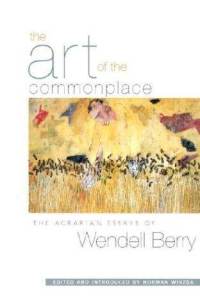 renowned (I think The Unsettling of America, publ
renowned (I think The Unsettling of America, publ
ished by the Sierra Club in hardback in 1977, the first Berry book I read, may have been the one to launch him to greater popularity) but Woiwode was also one who left the big city, like Berry, to return to his home state to take up a homestead, a rural vocation he took as a calling. Also, he is unashamed of being a Christian, and–except for the (perhaps) religiously-motivated slighting of Pappa John—seems to get away with describing his faith in the most prestigious venues in the country, as does Mr. Berry. Woiwode is, like Berry, besides a novelist, a poet and he does short stores and essays of literary and cultural criticism. So it surely seems he is perfect to introduce us to Mr. Berry’s agrarian vision, his fiction and nonfiction. I pray that the conservative evangelicals who tend to buy Crossway books will take up Berry’s novels, perhaps starting with Jayber Crow or Hannah Coulter. (Here is a splendid little review by a conservative Baptist inviting us to read good fiction, and particularly the likes of Hannah Coulter. It is a very nice review. Send it to your pastor, as he recommends that pastors read good novels!)
It may not interest everyone, but at the end of the essay about Berry in Words Made Fresh there is a coda, a several page bit of brilliance where Woiwode gives a fascinating description of the ups and downs of Berry’s independent publisher’s work to use quality ink and nice woodcuts on the covers, to smythe-sew the bindings of hardback editions (rather than gluing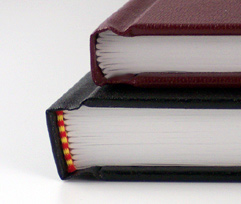 them in the procedure called perfect binding, which Woiwode slyly calls imperfect binding) and why acid free paper is so important. He notes their effort to issue his work in uniform editions. This, he astutely observes, is an “organized and sympathetic overview which in the past was a publisher’s way of indicating confidence in the writer’s future.” And he laments the plight of the indie publishers, noting those that went belly up or were bought out, now run by the aforementioned television corporations and oil companies. Anyway, it’s a good couple of pages that are a good tribute to publishers who try to do things well, especially apropos for an author who does things well, like Berry, like Woiwode. He ends this chapter, and the afterward about book binding, like this,
them in the procedure called perfect binding, which Woiwode slyly calls imperfect binding) and why acid free paper is so important. He notes their effort to issue his work in uniform editions. This, he astutely observes, is an “organized and sympathetic overview which in the past was a publisher’s way of indicating confidence in the writer’s future.” And he laments the plight of the indie publishers, noting those that went belly up or were bought out, now run by the aforementioned television corporations and oil companies. Anyway, it’s a good couple of pages that are a good tribute to publishers who try to do things well, especially apropos for an author who does things well, like Berry, like Woiwode. He ends this chapter, and the afterward about book binding, like this,
All of this should remind us, as Berry reminds us, to think small, not big. And to perhaps hold foremost the truth that we’re all at the mercy of time, that eventual sifter of the elements of history, whether written large or small across the decomposing substance of the present.
And so, for the various good chapters of Words Made Fresh gathered from Image and Books & Culture and a number of prestigious secular publications, we are thankful. We are glad to be able to feature just such a book—deeply rooted in the very Christian worldview that we ourselves work out of, but not preachy or pushy. This is top scholarship, mature and good and wise and often very, very moving. It is surely one of the best books of this sort in a long time and will should be considered as one of the better books of this year.
SPECIAL
DISCOUNT
– any book mentioned –
except the two from University of Kentucky Press.
20% off
order here
takes you to the secure Hearts & Minds order form page
inquire here
if you have questions or need more information
Hearts & Minds 234 East Main Street Dallastown, PA 17313 717-246-3333 

